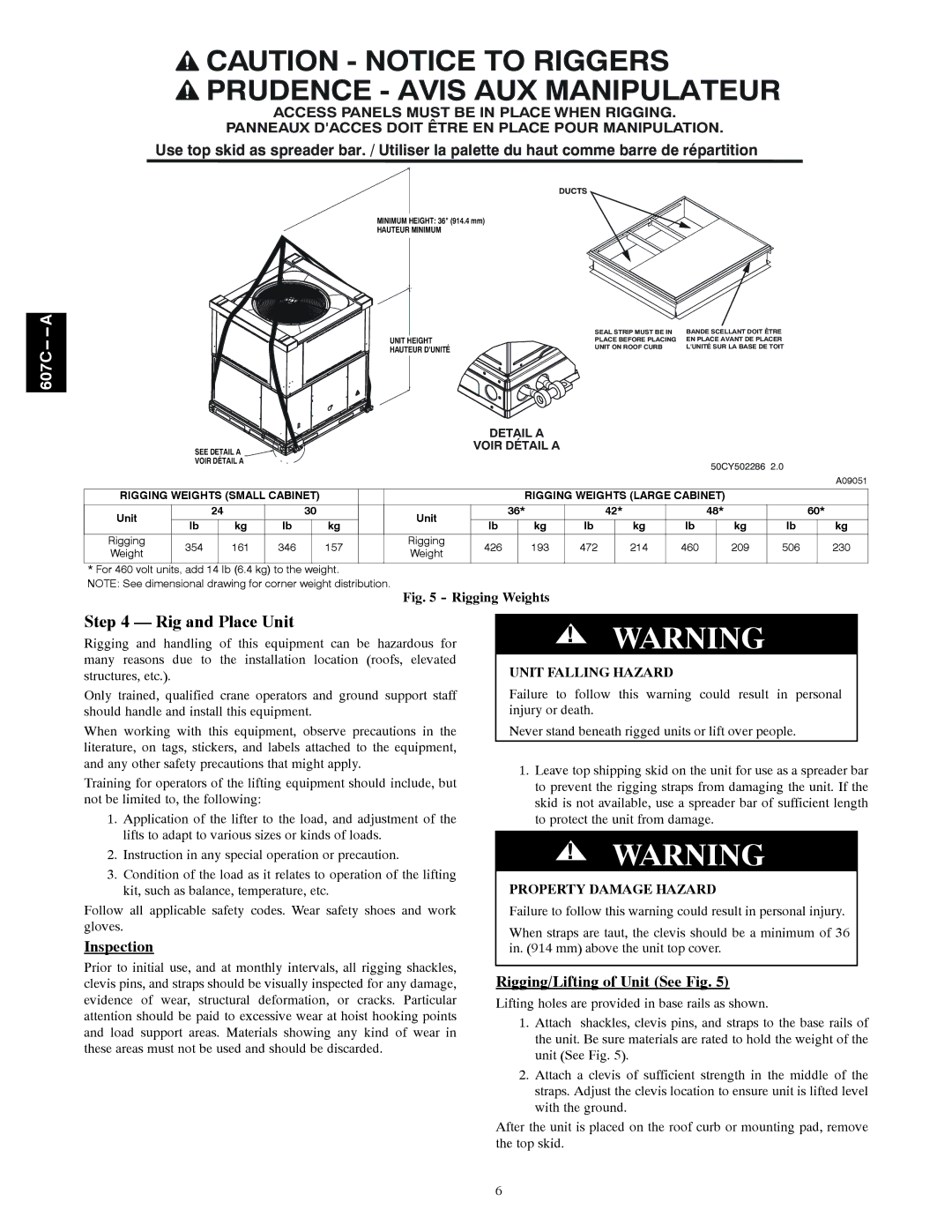
![]() CAUTION - NOTICE TO RIGGERS
CAUTION - NOTICE TO RIGGERS ![]() PRUDENCE - AVIS AUX MANIPULATEUR
PRUDENCE - AVIS AUX MANIPULATEUR
ACCESS PANELS MUST BE IN PLACE WHEN RIGGING.
PANNEAUX D'ACCES DOIT ÊTRE EN PLACE POUR MANIPULATION.
Use top skid as spreader bar. / Utiliser la palette du haut comme barre de répartition
DUCTS
MINIMUM HEIGHT: 36" (914.4 mm)
HAUTEUR MINIMUM
607C-- -- A
|
|
|
| BANDE SCELLANT DOIT ÊTRE |
|
|
|
| |
|
| SEAL STRIP MUST BE IN | ||
UNIT HEIGHT | PLACE BEFORE PLACING | EN PLACE AVANT DE PLACER | ||
HAUTEUR D'UNITÉ | UNIT ON ROOF CURB | L'UNITÉ SUR LA BASE DE TOIT | ||
|
|
|
|
|
|
|
|
|
|
|
|
|
|
|
|
|
|
|
|
|
|
|
|
|
|
|
|
|
|
| DETAIL A |
|
|
|
|
|
| ||
| SEE DETAIL A |
|
|
| VOIR DÉTAIL A |
|
|
|
|
|
| |||
|
|
|
|
|
|
|
|
|
|
|
| |||
| VOIR DÉTAIL A |
|
|
|
|
|
|
|
| 50CY502286 2.0 |
| |||
|
|
|
|
|
|
|
|
|
|
|
| |||
|
|
|
|
|
|
|
|
|
|
|
|
| A09051 | |
|
|
|
|
|
|
| ||||||||
RIGGING WEIGHTS (SMALL CABINET) |
|
|
| RIGGING WEIGHTS (LARGE CABINET) |
|
| ||||||||
Unit |
| 24 | 30 |
| Unit |
| 36* |
| 42* |
| 48* |
| 60* | |
lb | kg | lb | kg | lb | kg | lb | kg | lb | kg | lb | kg | |||
|
| |||||||||||||
Rigging | 354 | 161 | 346 | 157 | Rigging | 426 | 193 | 472 | 214 | 460 | 209 | 506 | 230 | |
Weight | Weight | |||||||||||||
|
|
|
|
|
|
|
|
|
|
|
| |||
* For 460 volt units, add 14 lb (6.4 kg) to the weight.
NOTE: See dimensional drawing for corner weight distribution.
Fig. 5 - Rigging Weights
Step 4 — Rig and Place Unit
Rigging and handling of this equipment can be hazardous for many reasons due to the installation location (roofs, elevated structures, etc.).
Only trained, qualified crane operators and ground support staff should handle and install this equipment.
When working with this equipment, observe precautions in the literature, on tags, stickers, and labels attached to the equipment, and any other safety precautions that might apply.
Training for operators of the lifting equipment should include, but not be limited to, the following:
1.Application of the lifter to the load, and adjustment of the lifts to adapt to various sizes or kinds of loads.
2.Instruction in any special operation or precaution.
3.Condition of the load as it relates to operation of the lifting kit, such as balance, temperature, etc.
Follow all applicable safety codes. Wear safety shoes and work gloves.
Inspection
Prior to initial use, and at monthly intervals, all rigging shackles, clevis pins, and straps should be visually inspected for any damage, evidence of wear, structural deformation, or cracks. Particular attention should be paid to excessive wear at hoist hooking points and load support areas. Materials showing any kind of wear in these areas must not be used and should be discarded.
!WARNING
UNIT FALLING HAZARD
Failure to follow this warning could result in personal injury or death.
Never stand beneath rigged units or lift over people.
1.Leave top shipping skid on the unit for use as a spreader bar to prevent the rigging straps from damaging the unit. If the skid is not available, use a spreader bar of sufficient length to protect the unit from damage.
!WARNING
PROPERTY DAMAGE HAZARD
Failure to follow this warning could result in personal injury.
When straps are taut, the clevis should be a minimum of 36 in. (914 mm) above the unit top cover.
Rigging/Lifting of Unit (See Fig. 5)
Lifting holes are provided in base rails as shown.
1.Attach shackles, clevis pins, and straps to the base rails of the unit. Be sure materials are rated to hold the weight of the unit (See Fig. 5).
2.Attach a clevis of sufficient strength in the middle of the straps. Adjust the clevis location to ensure unit is lifted level with the ground.
After the unit is placed on the roof curb or mounting pad, remove the top skid.
6
